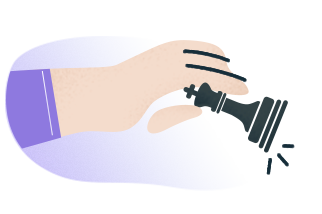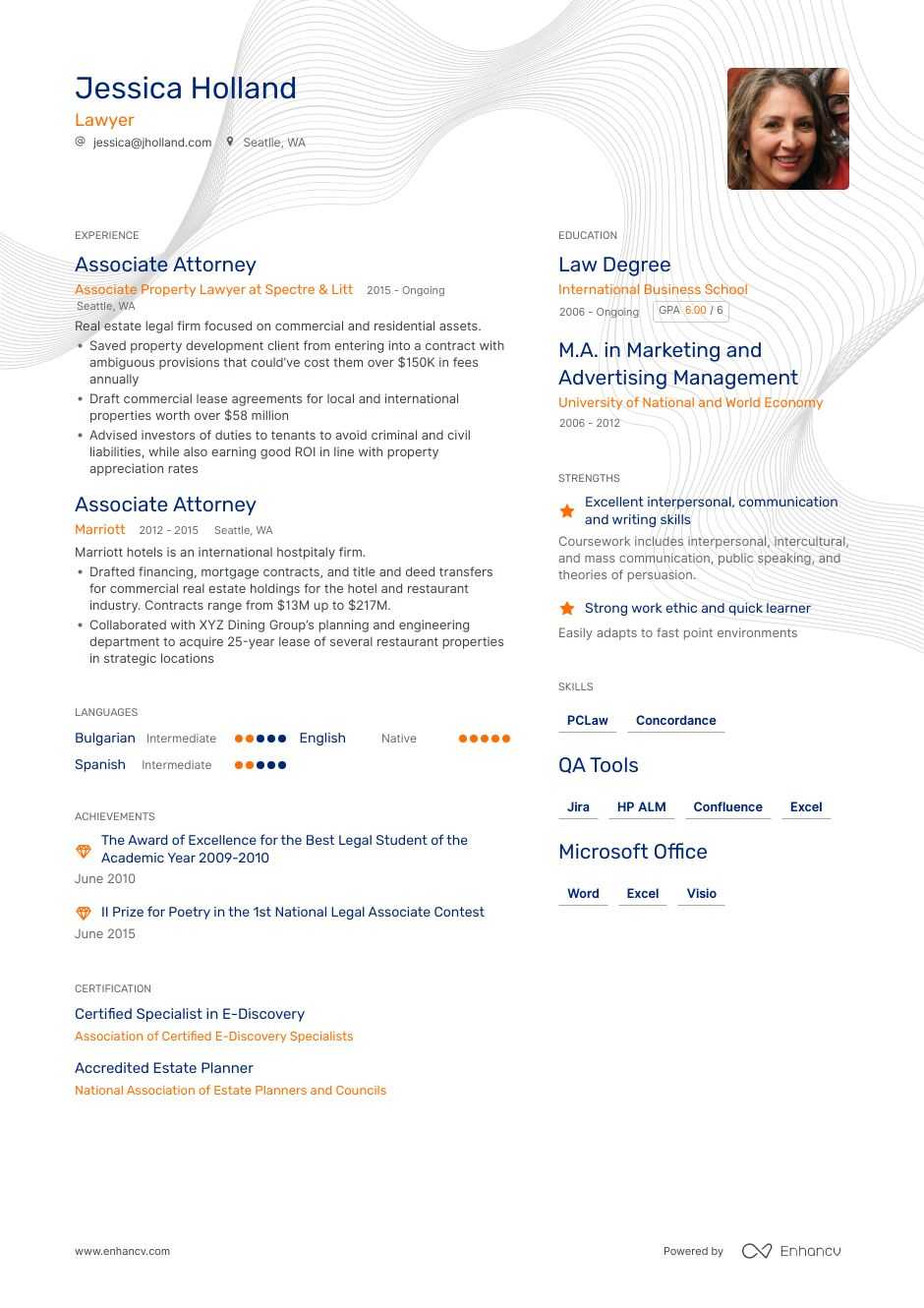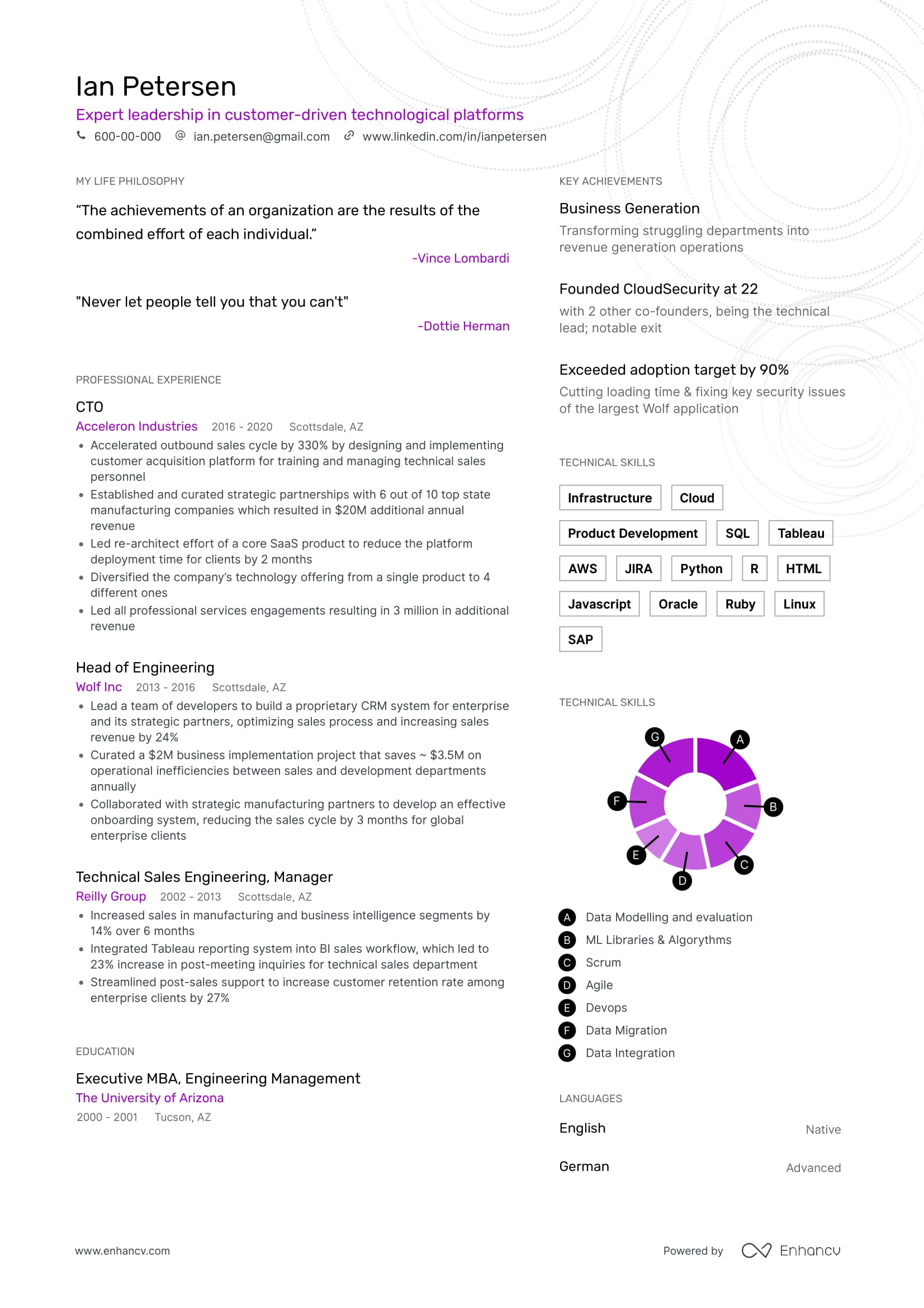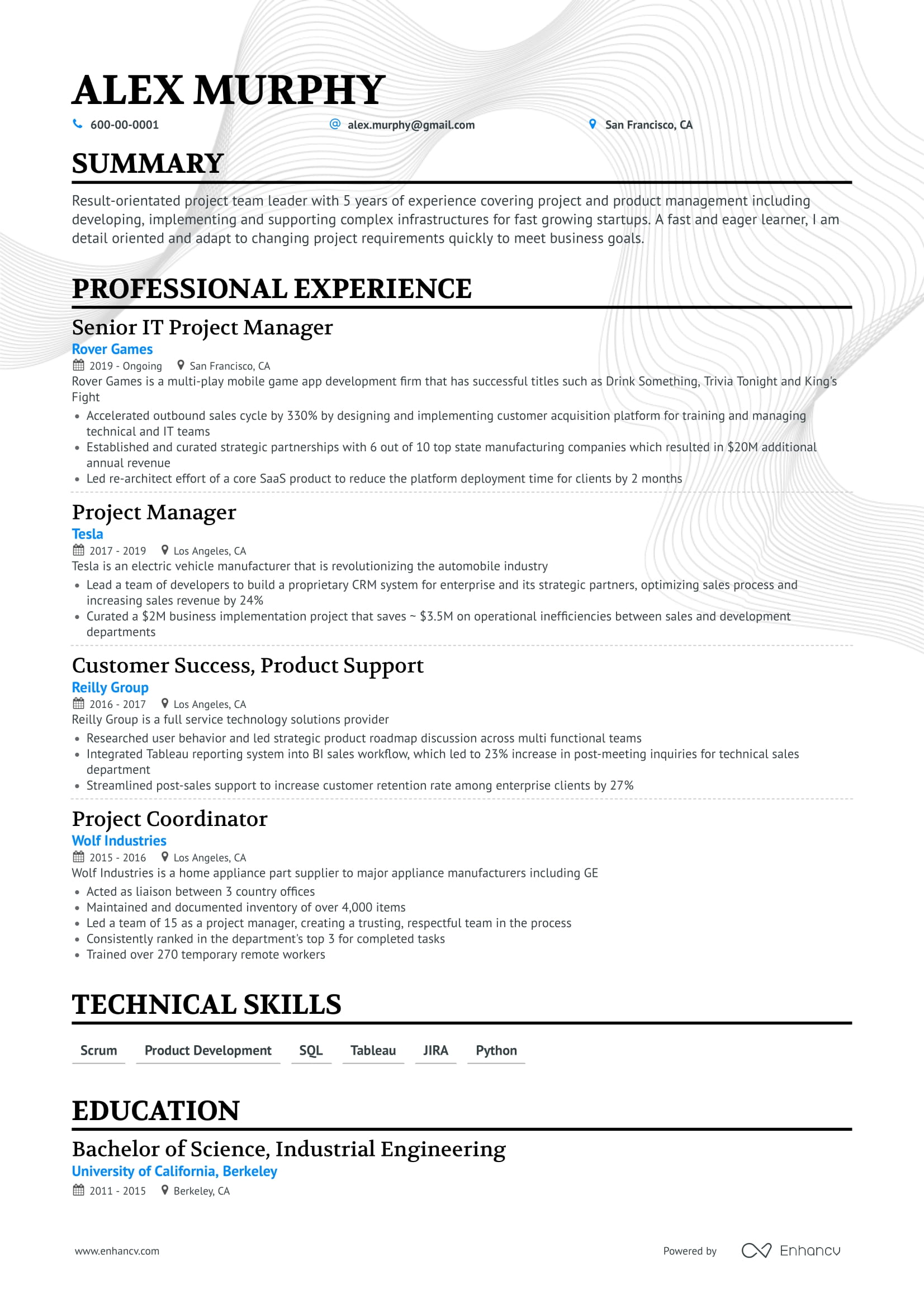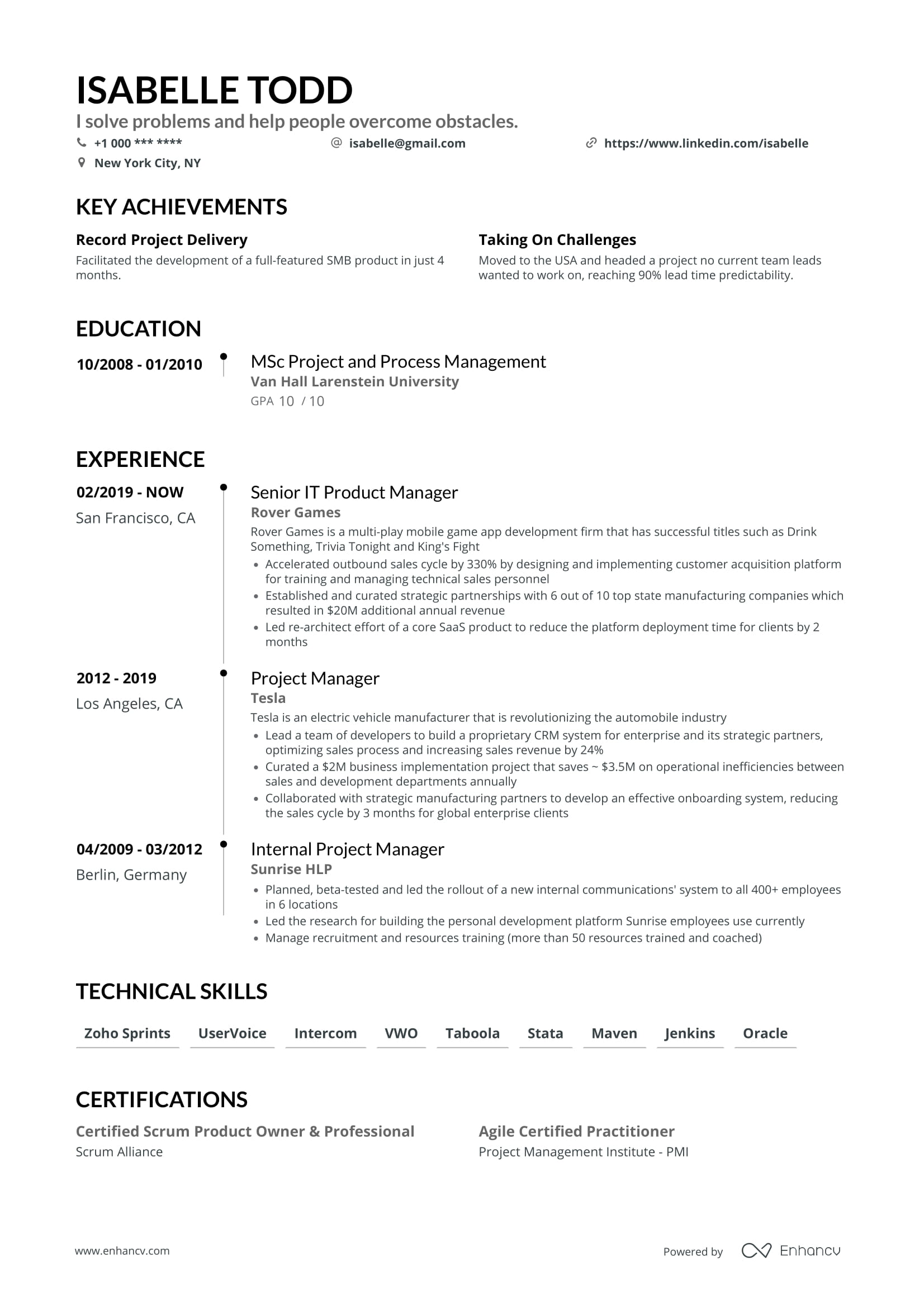Example Lawyer Resume - Browse more resume templates and build a stand-out resume
Fancy suits, 6-figure incomes, and a deadly combination of wit and cunning that win arguments.
Those are just a few things that come to mind when people think of lawyers.
Unfortunately, free self-help legal sites, virtual law offices, and legal outsourcing are cutting into the industry and forcing law firms to get creative.
Nowadays, you don’t get to the big bucks and fancy suits just because you have a Juris Doctor (JD). You have to prove your worth.
A lawyer’s job, after all, is all about what you can prove.
The competition is also fierce, both for those already in the field and those just starting out.
So to win a job, your resume and application materials have to be solid.
This guide will show you how to:
- Write about your legal achievements without disclosing sensitive client data
- Prove that not all lawyers are bad with technology and show off the legal tools you can use
- Show off what you’ve learned from law school even if you didn’t come from an Ivy school
Lawyer Resume Example
How to write a Lawyer Resume that Gets Read from Cover to Cover
Lawyers are known for being articulate, organized, and precise.
Clients and big law firms expect you to digest a lot of information in a short amount of time, keep discovery and client files organized, and be precise in your contracts and arguments.
Your resume may not be used to win a big case but it has to be articulate, organized, and precise too.
The lawyers who will read your resume are busy, and they prefer to read well-organized documents that highlight important information right off the bat.
Below are the most important sections to include on your resume.
Top 5 Sections for a Lawyer Resume
- Header
- Summary
- Professional Experience
- Education
- Licenses and Certification
An effective lawyer’s resume is well-articulated in that it clearly explains the kind of legal work you do and your ‘style’ as a lawyer.
Law encompasses a huge area of life and there are so many ways to be an effective lawyer.
Even within one practice such as personal injury, there are many sub-branches to specialize in like car or motor accidents,slip, and fall accidents, or premise liability.
Some lawyers like to win by finding precedents like theNFL precedent case that resulted in a $765 million settlement and can now be used as a precedent in relevant athlete-related injury. Other attorneys, however, win by going after the opposing party’s argument or credibility.
Your lawyer resume should also be precise enough that there are enough details to paint a clear picture of your qualifications and achievements.
5 Things Recruiters and Law Firm Partners Want to See in a Resume
- A header that states your legal practice and credentials
- Experience section that details your qualifications and trackable achievements in and out of the courtroom
- List of technical, job-specific, and soft skills that show how you can be an asset to their firm or business
- Licenses, certifications, and credentials related to your legal practice
- Education: Information about your pre-law and law degree, especially the school you attended.
Now that you have a big picture plan of what your resume should contain, let’s start off with the header.
Header Section for Legal Resumes
Don’t just write your name followed by “J.D.” and call it a day.
Your resume will be read by lawyers and non-lawyers so spell out abbreviations outside the J.D or J.S.D norm.
There are so many abbreviations like VAWA, DACA, SBA, etc. that it’s hard for even lawyers to keep up with all of them.
In the example above, it’s not clear what kind of corporate law Mr. Smith practiced. Does he handle mergers and acquisitions? Corporate governance and other operational issues? Or something else?
See? Much better.
His email also tells people what he does, and there’s an extra link to one of the lawyer directories where he’s listed, so that’s a plus.
Let’s continue strong with an attention-grabbing summary.
Summary: Your Lawyer Resume’s Opening Statement
Your summary is your opening salvo.
It sets the tone for how the judge and jury will look at your argument. The same goes for your resume.
You won’t get any points for writing a boring summary like this:
Write a snappy paragraph that includes your legal specialty, most notable win, and how many years you’ve been in that field.
Lawyers tend to have a strong personality, so it’s also important to show how you can fit in your target firm’s corporate culture.
Battle-tested is a better word than “experienced” as it shows the applicant handled his fair share of cases.
This summary also details the sub-specialties of personal injury law he specialized in, and his attitude towards work.
Professional Experience: Details and Evidence that Build a Winning Application
Nothing turns off a recruiter more than a resume that reads more like a job description.
That’s doubly true for the legal profession where lawyers are judged by their billable hours, cases won, and money claimed for their clients.
The lackluster work experience portrayed above lacks quantifiable results. It’s hard to tell what happened as a result of said contracts and advice given to clients.
There’s also no information on the type of law firm, is it a boutique firm or one with international offices?
Big firms have more resources and to some extent, more complicated legal work. As such, it’s easier to break into other big firms if you’ve already been employed in one.
Here’s a better example of a professional history section for a property lawyer:
The duties of the lawyer here are the same as those in the resume above, only with results added.
Even if the candidate disclosed the settlement amount and fees saved, he didn’t disclose the client’s name or the exact nature of their business to protect client confidentiality.
Not all lawyers are involved in business transactions though. If that’s your situation, you can always write about the cases you won, your skills in writing court documents, and your creativity in finding the appropriate charges to win your case.
That’s not to say you have to be a lead lawyer to write a good resume. Associate lawyers and even interns have something to contribute too.
For junior and associate lawyers, it’s helpful to include:
- Details of pro bono cases you practiced on
- Number of contracts drafted and reviewed
- The monetary value of those contracts
- Anything else you did to assist the partner mentoring you.
A Briefing of Your Skills
There’s a rumor going around in certain forums that say attorneys are not keeping up with technology.
Wherever you fall on that generational and technological divide, it’s hard to deny that law firms now expect candidates to be competent in certain areas of technology.
Recruitment firmRobert Half surveyed over 200 lawyers in the United States and found that 6 out of 10 based their hiring decisions on the applicant’s technical skills.
When asked which areas they expect lawyers to be competent, they chose:
- Cybersecurity - 48%
- Data analytics - 43%
- eDiscovery - 33%
- Artificial intelligence - 31%
- Blockchain - 17%
- Don’t know - 6%
- Not applicable - 9%
**Multiple responses were submitted
Demand for lawyers with knowledge of eDiscovery software and litigation systems to track evidence, case documents, and all client communications are high.
Some law firms even bring in candidates just to design complex databases to sort, index, and extract tones of data produced during litigation.
All that said, here’s a list of technical skills you may include on your resume:
Hard / Technical Skills List
- Practice Management Software Programs: Bill4Time, PCLaw, Amberlo, etc.
- eDiscovery Software: Ross, Concordance, Reveal, etc.
- Analytical reasoning
- Legal research
- Drafting and editing court documents
- Interviewing clients and witnesses
- Data analysis
You can also include a separate section for the sub-specialty areas of law you practice. Below are examples from different practices.
How Lawyers Should Describe Soft Skills on their Resume
Arguing cases isn’t the sole job of an attorney so you need to show some soft skills on your resume too.
Below is an example that would work for many legal fields:
Just write the soft skill you have and describe how it allowed you to do the job better.
Lawyers are expected to have a range of soft skills, not just the ones listed above. Here are other examples:
Soft Skills List
- Client Management
- Negotiation
- Teamwork
- Organization
- Persuasion
- Research
- Writing
- Documentation
Education
It’s true that some law firms prefer candidates from top Ivy schools.
Other law firms prefer graduates from their own alma mater. If a partner from one of your target firms went to your school too, that’s worth mentioning.
Fresh graduates ought to list their class ranking, bar exam ranking, and GPAs as well if they’re good. Law is a competitive field, so you have to make the most out of every advantage you have.
Example:
University of Houston Law Center, Houston, Texas
Juris Doctor
2012
Purdue University, West Lafayette, Indiana
B.A. (Public Communication, minors History, and English)
2009
Certificates
Lawyers have a variety of certifications to choose from depending on their field of practice.
Below are some of the most common:
Top 4 lawyer certificates for your resume
- CIPP/E Certification by the IAPP: The premiere certification when it comes to European data protection laws
- Board Certification in Criminal Trial Law by the National Board of Trial Advocacy
- Certified Specialist in E-Discovery by the Association of Certified E-Discovery Specialists
- Credit and Compliance Attorney Certification by the Association of Credit and Collection Professionals
Professional Associations and Memberships
This section is where you list your bar membership and other associations.
If you only have one membership, like the state where you practice, there’s no need to list it in a separate area.
You can just list the state where you’re licensed to practice at the top of the education section on your resume:
“Bar admissions: Texas” OR “State Bar Texas: 2018”
Listing the year shows when you got your license.
Don’t have a license yet? Waiting for results or waiting to be sworn in?
ABA for law students has a detailed guide on writing about bar admissions.Check it out.
If you’re a member of multiple associations, just list them in chronological order followed by the inclusive years of your membership.
Example:
State Bar of Texas, Liaison, Federal Judiciary Committee, 1992 - 1997
Texas Trial Lawyers Association, Member, 1989 - 1995
Publications
Articles you wrote about your legal specialty show your argumentative skills and prose. Getting published on a major legal site is also a badge of honor that adds to your credibility.
List them on your resume with the complete article title, publication name, and issue year.
Here’s an example way to list one of your published pieces fromPrice Ainsworth, Associate Attorney at Lorenz & Lorenz Personal Injury Lawyers:
Key Takeaways
- Don’t neglect technological skills on your resume
- Show quantifiable results in billable hours, settlements won, money savings, and increased productivity
- Be as detailed as possible, without divulging sensitive client information, on your work history
- State your legal specialty on the header, summary, and skills section of the resume. List your practice sub-specialties on the skills section too
